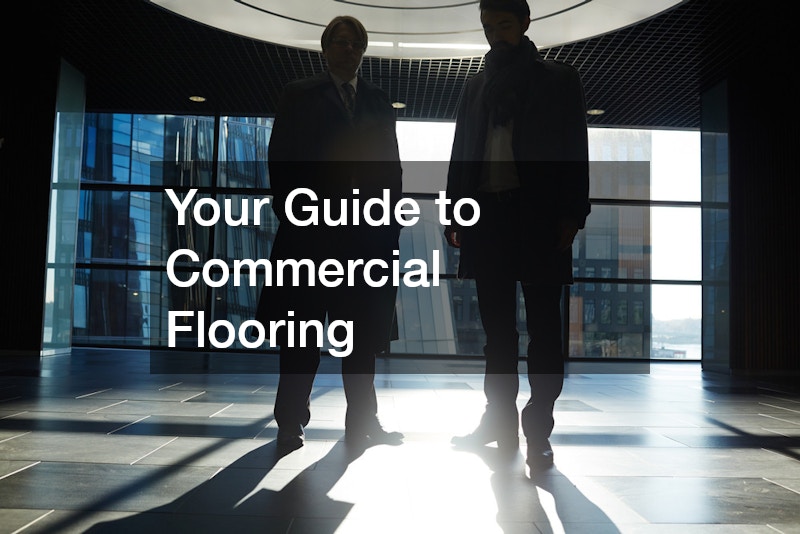When it comes to choosing the right flooring for commercial spaces, there are many factors to consider, including durability, cost, aesthetics, and ease of maintenance. Whether you’re outfitting a new office, retail space, or industrial facility, understanding the different types of commercial flooring options available can help you make an informed decision that aligns with your business’s needs. This guide will walk you through the key considerations for commercial flooring and explore the most common types available today.
Key Considerations When Choosing Commercial Flooring
Before selecting the type of flooring for your commercial space, it’s essential to assess a few key factors that will help you choose the best material for your needs.
Traffic Volume
One of the first things to consider is the amount of foot traffic the area will experience. High-traffic areas such as hallways, entryways, or retail floors need a durable flooring solution that can withstand constant use without showing significant wear. For less trafficked areas, you may have more flexibility in choosing a more aesthetic-focused flooring material.
Aesthetics
Commercial flooring often contributes significantly to the look and feel of a space. The right flooring can enhance the ambiance of your business, create a professional image, and even reflect your brand. The aesthetic choices for commercial flooring are varied, from sleek, modern finishes to traditional styles. Ensure that the flooring you select complements the overall design of your business.
Durability and Maintenance
Commercial floors must endure heavy use, spills, stains, and even harsh cleaning agents. Durability is key to keeping flooring in good condition over time. It’s also important to consider the level of maintenance required for each type of flooring. Some materials require frequent cleaning or refinishing, while others are easier to maintain.
Cost
Commercial flooring comes in a wide range of prices. While it’s important to stay within budget, it’s also essential to factor in the long-term costs, including installation and maintenance. Choosing a more expensive material might save you money in the long run if it is more durable and requires less maintenance.
Sustainability
As businesses become more environmentally conscious, many are opting for eco-friendly flooring options. Sustainable commercial flooring materials are made from renewable resources, require less energy to produce, and can be recycled at the end of their life cycle. Choosing green flooring solutions can help your business reduce its environmental footprint.
Types of Commercial Flooring
Once you’ve identified your priorities and preferences, it’s time to explore the most common types of commercial flooring available. Here’s a breakdown of some of the most popular options for businesses of all kinds.
1. Carpet Tiles
Carpet tiles are a versatile and popular choice for many commercial spaces, particularly offices, schools, and hospitality environments. They are easy to install, replace, and maintain, making them a cost-effective solution for businesses. Carpet tiles are available in a variety of colors, patterns, and textures, allowing you to create a customized look for your space. However, they may require more regular cleaning compared to other types of flooring, especially in high-traffic areas.
2. Vinyl Flooring
Vinyl flooring is a highly durable and budget-friendly option for commercial spaces. It’s available in a wide range of styles, including sheet vinyl, vinyl tiles, and luxury vinyl planks (LVP), which replicate the look of wood, stone, and other materials. Vinyl is resistant to scratches, stains, and moisture, making it ideal for high-traffic areas such as retail stores, restaurants, and healthcare facilities. Additionally, vinyl flooring is easy to clean and maintain, making it a practical option for busy businesses.
3. Wood Flooring
Hardwood flooring offers a timeless, sophisticated look that is ideal for commercial spaces where aesthetics are a priority. While wood floors may not be the best option for areas with high moisture or extreme wear, they are perfect for settings like offices, showrooms, and boutique retail stores. Modern engineered wood flooring options can offer enhanced durability and resistance to moisture, making them more suitable for commercial use. However, wood flooring can be more expensive and requires regular maintenance, such as refinishing to keep it looking its best.
4. Concrete Flooring
Concrete floors are increasingly being used in commercial spaces due to their versatility, durability, and modern aesthetic. Concrete can be polished, stained, or sealed to achieve a variety of looks, from sleek and industrial to more decorative and colorful finishes. It is an excellent choice for large commercial spaces such as warehouses, manufacturing facilities, or modern retail outlets. Concrete is highly durable, easy to maintain, and long-lasting. However, it can be prone to cracking and may not offer the warmth and comfort of other flooring options.
Watch the video above to learn more about commercial flooring!
.

